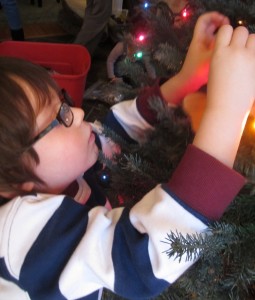Traveling with young children isn’t for the faint of heart. Parents have to plan ahead as much for a road trip with little ones as for the vacation destination itself, and that includes providing something for them to do hour after hour. We might call this journeying mercy, because fussy children can make for miserable miles.
Nate and I took our kids on countless road trips, all crammed into a station wagon. I recall one memorable journey during which we had the back seats folded flat, suitcases spread evenly like giant bricks that raised the floor, and children lying atop the luggage like sausages lined up in a fry pan. It was the only way to fit everyone in. Nowadays we’d be stopped and our children would be taken away as wards of the state.
But we always looked at the road trip as part of the vacation, even if it was 1500 miles long.
That is, unless we had a baby on board.
I remember one trip in particular when one of our toddlers tried to literally chew her way through her car-seat strap in an effort to set herself free, screaming between every chew.
I also recall being desperate to stop one of our 3 month olds from crying, buying her a Dairy Queen cone and feeding it to her in tiny bites, her first food other than breast milk. It worked beautifully, at least for a few miles.
Tonight Linnea, Adam, and their 3 little ones arrived in our driveway after two days on the road, just in time for a pot roast dinner. They were grateful to end their long journey, because little Autumn, 9 months old, had been a traveling challenge all the way. Skylar and Micah, ages 4 and 2, had a general understanding that Grandma Midgee’s house was far, far away and it would take many hours to get there.
But Autumn? She couldn’t understand and lost patience in a hurry, letting everyone know she wasn’t happy with the length of the trip.
She acted much like I sometimes do when traveling with the Lord through days and weeks of time. If I don’t know how much longer the project or trial will last, I cry out to him in a mix of frustration and irritation. “Are we there yet?”
When he says no, it’s, “Waaa! How much longer do I have to endure this!”
But as Adam drove across the country from Florida to Michigan, he had his mind on a clear destination, and each mile brought his family closer to the goal. God has a clear destination in mind for me, too, even though I might not know what it is on any given day. It pleases him if I stop whining and accept the peace he offers as we move along. When I remain calm, trusting he’ll eventually put me down in a place that’s good, he’ll provide journeying mercy, all along the way.
“A person’s steps are directed by the Lord. How then can anyone understand their own way?” (Proverbs 20:24)





